Marcia Sirota's Blog, page 9
January 31, 2022
Barbershops Where Men of Colour Can Find Mental Health Support
I was looking through the CBC website, Being Black in Canada the other day and I came across an amazing initiative that’s been set up for Black men in the Halifax area. A couple of barbershops are offering free cuts, shaves, and fades twice a week, and at the same time, it offers the participants free mental health support.
Dr. Ron Milne, who is spearheading this initiative, said that men, in general, don’t feel comfortable talking about their mental health, but this barbershop model has been successful elsewhere and he wanted to try it in his community.
The men and boys who show up at the barbershops get to talk about anything from racism in the workplace and issues with the police, to how the pandemic has disproportionately affected people of colour. The participants have an opportunity to vent their frustrations and receive real support for their challenges with mental health.
 Source: Pexels.comThe Confess Project connects Black men with mental health support
Source: Pexels.comThe Confess Project connects Black men with mental health supportLooking around, I discovered that this idea of barbers taking on a supportive role is widespread. In an article in Healthline, the author, Cathy Cassata writes about Lorenzo P. Lewis who in 2016 started the Confess Project, as the first mental health barbershop movement in the US.
Lewis is quoted in the article as saying that, “barbershops have been used for social justice back to the civil rights era, and there is a lot of historical context around the barbershop, so I took this history… and extended it out to help barbers be advocates in their community.”
Lewis added that, “there is confusion of where to go for services and how to access them. Barbers know their clients and can help. They can be leaders and mental health advocates in their community in nontraditional, hands-on ways. They’re not counseling clients, but supporting them, listening to them, and sharing resources so they can get the help they need.”
Lewis is also quoted in the article as saying that, “there is a big lack of understanding of the Black male experience, and so many people who work in academic and clinical settings may not be as educated as needed about how Black men show up in work, school, and social groups.”
 Photographer: Robina Weermeijer | Source: UnsplashI received zero education about mental health in the BIPOC community
Photographer: Robina Weermeijer | Source: UnsplashI received zero education about mental health in the BIPOC communityI wholeheartedly agree with this statement as I received exactly zero education either in medical school or in my psychiatry residence about systemic racism in healthcare or about the experience of BIPOC individuals around mental health.
I’m sure that I’m not alone. After decades of practice, I’ve only just begun to see workshops offered in dealing with systemic racism and in mental health and the BIPOC community.
In an article from Counseling Today, the authors write about the role of barbershops for African American men, noting that “research shows that within the African American community, mental health issues are rarely discussed, and… African American men are socialized to handle difficulties or problems by themselves or with close friends and family members, not with the help of outsiders such as professional mental health service providers.”
The article concluded by saying that, “although it does not replace professional counseling, the barbershop could be a window of opportunity for increasing mental health treatment for deeper psychological issues. As the literature reports, programs such as the Confess Project are successful in providing education to barbers to recognize mental health issues.”
At a time when BIPOC individuals are struggling with deepening systemic racism, increased microaggressions and macro-aggressions, as well as the impact of COVID on their communities, it’s gratifying to see these grassroots initiatives springing up across the US and Canada.
It’s a terrific idea to take advantage of venues like barbershops that are already seen as safe spaces in which to share thoughts and feelings. I applaud all the people involved in setting up these initiatives.
 Photographer: christopher lemercier | Source: UnsplashMen, in general, are reluctant to seek out mental health services
Photographer: christopher lemercier | Source: UnsplashMen, in general, are reluctant to seek out mental health servicesAs the research has shown, men are often reluctant to seek mental health help, and men of colour, perhaps even more so. By creating a simple way of accessing mental health support, these innovators are doing an enormous service for the BIPOC community.
These initiatives are reducing suffering and improving the quality of lives, not just for the participants but for their families and their communities as a whole. Governments should take note and offer funding to anyone who is setting up these types of programs.
______
Sign up here for my free biweekly wellness newsletter that brings you fresh, thought-provoking content.
Subscribe to my YouTube Channel where you’ll learn simple tips for taking the best care of yourself and your loved ones.
Tune in to my Ruthless Compassion Podcast where I go in-depth about topics like mental health, trauma, and loneliness.
if(window.strchfSettings === undefined) window.strchfSettings = {};window.strchfSettings.stats = {url: "https://marciasirotamd.storychief.io/... "Barbershops Where Men of Colour Can Find Mental Health Support",id: "84fb0907-fb13-4676-8158-d29510e9b589"};(function(d, s, id) {var js, sjs = d.getElementsByTagName(s)[0];if (d.getElementById(id)) {window.strchf.update(); return;}js = d.createElement(s); js.id = id;js.src = "https://d37oebn0w9ir6a.cloudfront.net... = true;sjs.parentNode.insertBefore(js, sjs);}(document, 'script', 'storychief-jssdk'))
The post Barbershops Where Men of Colour Can Find Mental Health Support appeared first on Marcia Sirota.
Why (Almost) Everyone Loves Amy Schneider
I was so disappointed when Amy Schneider’s historic Jeopardy run came to an end this past Wednesday night when she lost her 41st game. I’d been enjoying the show immensely and was having a great time watching her dominate the matches, right from the start. What surprised me was how many other people shared my exact feelings.
I was reading a Twitter feed that started with the New York Times announcing that Amy’s run was finally over. This was re-tweeted by none other than Padma Lakshmi, who added a comment, saying that Amy is “an icon, she’s a legend, and she IS the moment,” to which Amy replied, “OMG!!!!! I can’t believe my life right now.”
These tweets were followed by an almost unending list of comments, all of them from people telling Amy how much they loved her and missed her and wanted only good things in the future for her. People really love her, and it got me thinking.
 Photographer: Brett Jordan | Source: UnsplashAmy Schneider is authentic and vulnerable
Photographer: Brett Jordan | Source: UnsplashAmy Schneider is authentic and vulnerableWhat is it about Amy Schneider that has endeared her to so many Jeopardy watchers and has made fans of so many others? Well, she’s friendly, open, and vulnerable. She’s utterly authentic, never trying to be anything she’s not. She loves her girlfriend, her mother, her cat, and she lets everyone know it.
She’s also gutsy, funny, sweet, nerdy, grateful, inclusive, and warm. She has quirky mannerisms and good humour. She’s not arrogant, imposing, aggressive, divisive, condescending, or bitter. She accepted her loss without complaining and she praised the person who beat her while asking people to support him.
In a time when opinions often matter more than facts, Jeopardy is ultimately a game of facts with Amy demonstrating a tremendous mastery of them. She made knowing the facts seem cool again. She also made kindness and politeness cool again.
 Photographer: Ralph (Ravi) Kayden | Source: UnsplashShe represents qualities we didn’t realize we’ve been longing for
Photographer: Ralph (Ravi) Kayden | Source: UnsplashShe represents qualities we didn’t realize we’ve been longing forAmy Schneider represents traits that we didn’t realize until now that we missed: she’s humble, courteous, thoughtful, and caring. She wants the best for everyone. What a refreshing change from what we usually see on TV these days.
Reality TV and divisive politics have made behaving badly the norm, these days. We’ve become so inured to horrible behaviour that oftentimes, we barely react when we see another reality show contestant, politician, or social media influencer saying or doing something utterly egregious.
People with broad platforms, such as podcasters and radio hosts think nothing of spouting absurd opinions while viciously trolling those who speak the truth. They bash science and promote conspiracy theories. They brag about their material possessions, showing off their wealth and fame as though these things in any way indicated their worth.
And then there’s Amy Schneider. Unabashedly smart, unashamed of her prodigious knowledge base, and always conducting herself impeccably. She has poise, she has grace, she has class. She has exemplified the kind of person we’ve been missing in the media, these last few years.
 Photographer: Joe Ciciarelli | Source: UnsplashIt’s still not cool to be seen as an openly-smart woman
Photographer: Joe Ciciarelli | Source: UnsplashIt’s still not cool to be seen as an openly-smart womanAnother thing we love about Amy is how brilliant she is. Even in 2022, it is still not considered cool for a woman to be openly smart. Who knows? It might be just as radical for a woman to come out as intelligent and fact-based, these days, as it is to come out as trans like Amy.
Her being trans is great for representation and to show everyone that absolutely, there’s a place for them in society, and that being a smart woman proud of her intellectual prowess, well, that’s ground-breaking!
As much as we need representation for the trans community, we need it just as much for smart women, and for kind, polite people in general.
The fact that Amy embodies so many of the things that we need to see more of these days is why, I believe, almost everyone loves her so much.
 Photographer: Towfiqu barbhuiya | Source: UnsplashAmy Schneider is a really smart, really kind woman
Photographer: Towfiqu barbhuiya | Source: UnsplashAmy Schneider is a really smart, really kind womanShe recently tweeted that she wanted to “thank all the people who have taken the time, during this busy holiday season, to reach out and explain to me that, actually, I’m a man. Every single one of you is the first person to ever make that very clever point, which had never once before crossed my mind.”
That is the epitome of Amy Schneider. Funny, sarcastic but in the sweetest way, and naturally, whip-smart. She is clever enough not to argue with these people or to engage with them in their ignorance. She merely acknowledges their remarks and destroys them with her absolutely brilliant retort.
Of course, there will always be those narrow-minded, rigid, closed-off individuals who insist that being trans is not a thing. But these are the same type of people as those who’d say that women shouldn’t go out to work because we weren’t “emotionally stable” enough to hold a job.
These are the same type of people as those who’d say that women shouldn’t have the right to vote, because we aren’t capable of comprehending the nuances of politics. These are the same type of individuals who think that “conversion therapy” is an appropriate way of responding to a gay child.
 Photographer: Hannah Busing | Source: UnsplashAmy Schneider is out there, living her best life, showing the world that being a super-smart, super-kind, super-classy woman is the coolest thing, ever.
Photographer: Hannah Busing | Source: UnsplashAmy Schneider is out there, living her best life, showing the world that being a super-smart, super-kind, super-classy woman is the coolest thing, ever. Most of us adore her for it. And for those who can’t get past the fact that she’s trans, or for those who can’t get over the fact that the world is celebrating an intelligent woman, well, they’re just missing out on being part of the best fan club, ever.
______
Sign up here for my free biweekly wellness newsletter that brings you fresh, thought-provoking content.
Subscribe to my YouTube Channel where you’ll learn simple tips for taking the best care of yourself and your loved ones.
Tune in to my Ruthless Compassion Podcast where I go in-depth about topics like mental health, trauma, and loneliness.
if(window.strchfSettings === undefined) window.strchfSettings = {};window.strchfSettings.stats = {url: "https://marciasirotamd.storychief.io/... "Why (Almost) Everyone Loves Amy Schneider",id: "84fb0907-fb13-4676-8158-d29510e9b589"};(function(d, s, id) {var js, sjs = d.getElementsByTagName(s)[0];if (d.getElementById(id)) {window.strchf.update(); return;}js = d.createElement(s); js.id = id;js.src = "https://d37oebn0w9ir6a.cloudfront.net... = true;sjs.parentNode.insertBefore(js, sjs);}(document, 'script', 'storychief-jssdk'))
The post Why (Almost) Everyone Loves Amy Schneider appeared first on Marcia Sirota.
January 24, 2022
When it Comes to Mental Health, We Shouldn’t Expect Our Loved Ones to Just “Snap Out of It.”
Lately, I’ve been working as an independent psychiatric assessor, interviewing people who are off work for reasons of mental health. I’ve been learning a lot from the experience, including some telling details about the reactions of friends and family to people who are experiencing mental health conditions.
The majority of the people I assess are doing quite poorly. They’re unable to function, both at home and in the workplace. They want to get on with their lives but without the proper diagnosis and treatment, they just can’t. Many of them have a history of childhood trauma which has made them more vulnerable to stress in their adult lives. Some have a family history of mental health conditions.
Many of the people I speak to have more than one mental health condition, including major depression, generalized anxiety disorder, post-traumatic stress disorder, obsessive-compulsive disorder, personality disorder, and/or an eating disorder. Many have severe insomnia and/or problems with addiction.
Sadly, I’ve found that a significant number of loved ones have a limited understanding of mental illness and minimal awareness of the signs and symptoms of mental health conditions. They often lack patience or tolerance toward the person who is suffering, which only increases the person’s shame and guilt about having a problem.
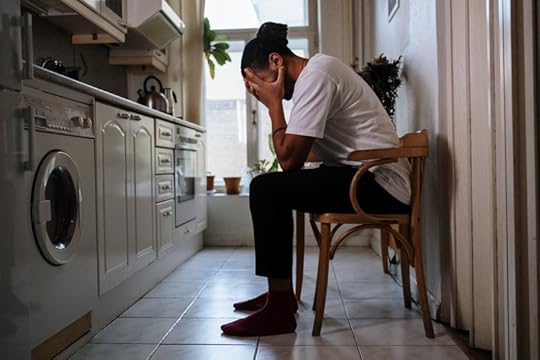 Source: Pexels.comPeople who are suffering think they should be able to “shake it off”
Source: Pexels.comPeople who are suffering think they should be able to “shake it off”I have found that many people who experience mental health challenges feel like they should be able to talk themselves out of their condition. Many think that they’re “weak” or “stupid” for failing to do so. The truth is that they’re failing because it’s not possible to talk themselves out of a mental health condition.
In fact, one of the ways we know that someone has a mental illness is that they can’t talk themselves out of it. When the person can’t force themselves to “cheer up” or to “calm down,” or to “think positive” or to “get some sleep;” when they can’t “just stop” their dysfunctional behaviours, that’s when we know it’s about more than simply having a really bad day.
Pretty much anyone can shake off a bad day. No-one can shake off a mental health condition, once it has set in.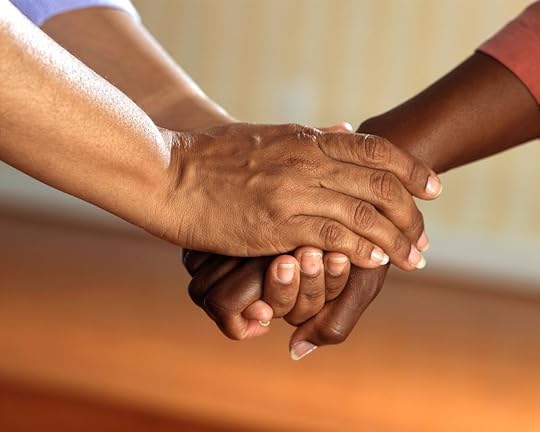 Source: Pexels.comPeople with mental health challenges need support and understanding
Source: Pexels.comPeople with mental health challenges need support and understandingThe people I assess have told me that their spouse has complained that they’re not attending to the household chores when they don’t even have the energy to take a shower or make themselves a meal. Some people have told me that their parents were angry at them for spending the whole day in bed, while they’re lying there, overwhelmed by thoughts of death or paralyzing fears.
People who are dealing with mental health conditions need our support and our understanding. Friends and family members need to educate themselves about what mental illness looks like and how it affects a person in the short term and in the long run. They need to resist criticizing the individual who is suffering for not doing the things that their mental illness has prevented them from doing.
As I mentioned in a previous article about how to talk to someone with depression, things that friends and family members shouldn’t say include “snap out of it,” “you brought this on yourself,” “it’s not so bad,” and “it’s going to be okay.” They also shouldn’t call the other person “lazy” or “unreasonable” for being unable to cope with the normal stresses and responsibilities of life.
The problem with mental illness is that the affected individual doesn’t necessarily look “sick.” The condition is in their brain, not their body, so they don’t necessarily manifest the signs of illness that we expect to see in someone who is unwell. That doesn’t mean that they’re not suffering from a real condition—one that is not going away on its own.
 Source: Pexels.comOffering someone a diagnosis is an acknowledgment of their suffering
Source: Pexels.comOffering someone a diagnosis is an acknowledgment of their sufferingMy role as an independent assessor is to provide a diagnosis and make treatment recommendations to the person’s primary care provider. Once a diagnosis is established, it is much easier to gear the treatment to the specific condition (or conditions) affecting the individual. I will often recommend a combination of medication and talk therapy, and sometimes I’ll suggest a rehabilitation program as well.
Even though these are diagnostic interviews as opposed to psychotherapy sessions, many of the people I speak with feel a profound sense of relief by the end of our conversation. This is because I’m taking their problems seriously. Usually, I’m telling the person “yes, you do have a real problem. No, you’re not imagining things. And FYI, it won’t go away on its own.”
This is reassuring to the other person because it enables them to let go of some of the guilt and shame they’ve been carrying, and it empowers them to ask for more respect, tolerance, and understanding from their loved ones.
We can all do better in our dealings with people who experience mental illness. Bell’s Let’s Talk Day is coming up, so I invite everyone to inform themselves and to become better allies to the people in their lives who struggle with mental health conditions. I invite you to sit down and talk to the person who is suffering and to ask them how you can better support them, now and in the future.
______
Sign up here for my free biweekly wellness newsletter that brings you fresh, thought-provoking content.
Subscribe to my YouTube Channel where you’ll learn simple tips for taking the best care of yourself and your loved ones.
Tune in to my Ruthless Compassion Podcast where I go in-depth about topics like mental health, trauma, and loneliness.
if(window.strchfSettings === undefined) window.strchfSettings = {};window.strchfSettings.stats = {url: "https://marciasirotamd.storychief.io/... "When it Comes to Mental Health, We Shouldn’t Expect Our Loved Ones to Just “Snap Out of It.”",id: "84fb0907-fb13-4676-8158-d29510e9b589"};(function(d, s, id) {var js, sjs = d.getElementsByTagName(s)[0];if (d.getElementById(id)) {window.strchf.update(); return;}js = d.createElement(s); js.id = id;js.src = "https://d37oebn0w9ir6a.cloudfront.net... = true;sjs.parentNode.insertBefore(js, sjs);}(document, 'script', 'storychief-jssdk'))
The post When it Comes to Mental Health, We Shouldn’t Expect Our Loved Ones to Just “Snap Out of It.” appeared first on Marcia Sirota.
Compassion Fatigue Could Create a New Epidemic of Intolerance in Canada
It’s coming to the end of January 2022 and the Omicron variant shows no signs of slowing down. So many people are getting infected with COVID that most businesses are short-staffed and unable to operate at full capacity.
Those who are vaccinated are experiencing much milder disease and they’re less infectious and more briefly infectious than the unvaccinated, but this can’t be said for the unvaccinated.
The ICUs here in Ontario are packed and important procedures like cancer surgery, heart surgery and surgery to repair birth defects in children are being postponed. People are becoming more and more frustrated with the unvaccinated, who they blame for the majority of these problems.
A poll conducted by Maru Public Opinion over January 14 and 15, 2022, showed that two-thirds of Canadians were in favour of mandatory vaccines for people over the age of five. A third of the respondents found it acceptable if the unvaccinated weren’t permitted to renew their driver’s license.
As well, 27 per cent approved of the unvaccinated serving a five-day jail sentence for endangering others and overwhelming the healthcare system, and 37 per cent agreed that the unvaccinated should not have access to any publicly funded medical services.
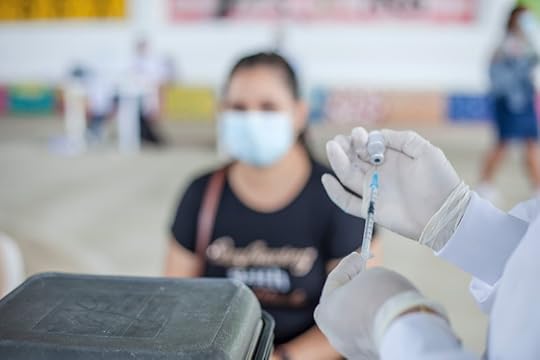 Source: Pexels.comPeople are becoming angrier and less tolerant of the unvaccinated
Source: Pexels.comPeople are becoming angrier and less tolerant of the unvaccinatedWhile most of these mandates aren’t plausible or even constitutional, the survey responses indicate some incredibly strong feelings on the part of Canadians who, as a rule, tend to be more moderate in their sentiments. It shows how overwhelmed everyone is by the pandemic and how much all of us want things to get back to normal.
Many Canadians are furious at the unvaccinated who they see as perpetuating the pandemic and increasing everyone’s suffering. They’re losing all patience with the portion of the population that continues to refuse the shot. Most of the time, Canadians are willing to agree to disagree with one another, but it’s less and less so when it comes to vaccinations these days.
 Photographer: SJ Objio | Source: UnsplashHealthcare workers are at risk of compassion fatigue
Photographer: SJ Objio | Source: UnsplashHealthcare workers are at risk of compassion fatigue In general, compassion fatigue is on the rise. Health-care workers are exhausted and are having to care for hostile patients who, as they’re struggling with COVID, are screaming at them that the virus is a hoax and are refusing the proper treatments. Some healthcare staff are being threatened by angry mobs who are calling them murderers for encouraging vaccinations and treating their patients for COVID.
It's difficult to know how to manage this situation. What I do know is that society seems to be splitting along the lines of the vaccinated and the unvaccinated, and this can’t be good for any of us.
The unvaccinated are more and more furious about what they perceive as their rights being impinged, and the vaccinated are more and more furious over their belief that the unvaccinated are preventing them from getting back to their normal lives. I fear things getting worse as the government starts to crack down even more on the unvaccinated.
We need to find a balance, in which we do what’s best for our society, but not in a punitive way. We need to have compassion for all citizens, even if it’s ruthless compassion. By that, I mean combining the tolerance and understanding of traditional compassion with clarity and tough-mindedness.
With ruthless compassion, we understand that the government has to do what’s best for the majority of the population, even when there’s a small minority that’s opposed to it.
 Photographer: Tingey Injury Law Firm | Source: UnsplashSociety has always balanced the needs of the many against the desires of the few
Photographer: Tingey Injury Law Firm | Source: UnsplashSociety has always balanced the needs of the many against the desires of the fewThis has always been the case. A minority of people were vehemently opposed to seat belts in cars, but they became the law. Some people were opposed to motorcycle helmets, but again, the law was put into place. Some people were furious about smoking being banned from indoor areas, but again, this became the law. The government is always having to put aside the interests of certain small groups in order to prioritize the good of the majority.
We can appreciate the fact that our government is trying to do its best for all of us and we can have compassion for one-another. The unvaccinated can appreciate how the rest of society feels about their choices, and the vaccinated can be more understanding about where the vaccine-hesitant are coming from.
 Photographer: Hannah Busing | Source: UnsplashWe can’t risk losing our compassion for one-another
Photographer: Hannah Busing | Source: UnsplashWe can’t risk losing our compassion for one-anotherIf we all lose our compassion, we’re at risk of going from a pandemic of COVID to an epidemic of anger, hatred, and intolerance. Given that we all want our lives to go back to normal, we need to recognize that being in a constant state of conflict with one-another is not the way that this will happen.
As angry, frustrated and overwhelmed as we are, we need to make some room in our hearts to include those who don’t think the way we do. Practicing ruthless compassion is the only way we’re going to get through the pandemic with our mental health intact, and it’s the only way we’re going to return to a civilized society, post-pandemic.
______
Sign up here for my free biweekly wellness newsletter that brings you fresh, thought-provoking content.
Subscribe to my YouTube Channel where you’ll learn simple tips for taking the best care of yourself and your loved ones.
Tune in to my Ruthless Compassion Podcast where I go in-depth about topics like mental health, trauma, and loneliness.
if(window.strchfSettings === undefined) window.strchfSettings = {};window.strchfSettings.stats = {url: "https://marciasirotamd.storychief.io/... "Compassion Fatigue Could Create a New Epidemic of Intolerance in Canada",id: "84fb0907-fb13-4676-8158-d29510e9b589"};(function(d, s, id) {var js, sjs = d.getElementsByTagName(s)[0];if (d.getElementById(id)) {window.strchf.update(); return;}js = d.createElement(s); js.id = id;js.src = "https://d37oebn0w9ir6a.cloudfront.net... = true;sjs.parentNode.insertBefore(js, sjs);}(document, 'script', 'storychief-jssdk'))
The post Compassion Fatigue Could Create a New Epidemic of Intolerance in Canada appeared first on Marcia Sirota.
January 21, 2022
There’s a Reason Why Lena Dunham is Receiving Horrible Hate Mail
I read an article the other day about the writer and actor, Lena Dunham, who shared that she had received a lot of online hate messages as a result of her groundbreaking TV show, Girls. It struck me that the vicious comments were most likely coming from a very specific point of view—that of, “how dare you—a not-skinny woman—feel entitled to be a leading lady, an overtly sexual being, and a person who is comfortable showing your body on-camera?”
It struck me that these hateful comments, including, “You’re fat, you’re ugly and you deserve to die,” are coming out of a misplaced sense of outrage over Dunham being perfectly comfortable in her own skin, and not attempting to conform to the ridiculously narrow stereotype of what a “beautiful and desirable” female appearance should be.
In certain parts of our society, only a reed-thin woman with a standard type of face is “allowed” to be seen, and to see herself, as beautiful and desirable. When we ask, “who dictates this standard?” it’s clearly not anyone who loves, understands, or appreciates the wide diversity of women.
It’s also not anyone who respects those who might be attracted to women, because in severely limiting what is considered desirable, the standard-makers are depriving all these other people of the pleasure of a diverse selection of women to admire.
I remember reading a fascinating article a couple of years ago that showed pictures of dozens of models who were used to advertise certain products, like shampoo and face cream. The article had all the photos of the models lined up, and their faces and bodies were so eerily similar that they were essentially interchangeable. They all conformed to “a type”—a type that Lena Dunham—and millions of other women—don’t conform to.
 Photographer: Arlington Research | Source: UnsplashCorporations determine what is attractive in order to sell products
Photographer: Arlington Research | Source: UnsplashCorporations determine what is attractive in order to sell productsFrom my experience, the decision on who sets the standard is simple. It originates in corporations run mostly by rich, middle-aged white men who decided a while back that a certain “type” was more likely to sell their products and increase their profits. These men determined that this look, and only this look, was the standard of feminine beauty, and ever since then, they’ve been unwavering in their decision, at least until recent demands for diversity and inclusion have begun to affect their bottom line.
But even with the occasional nod to diversity in advertising and the media, the narrow beauty standard remains entrenched, and this is why it’s been still so difficult for anyone who doesn’t conform to the “type” to be taken seriously for a starring role in an ad, on TV, or in the movies, and it’s why Lena Dunham still gets hate. Once a precedent has been established, it becomes awfully difficult to shift.
The problem with this corporate-based standard of attractiveness is that representation matters, and what we see in the ads and on-screen becomes what we believe to be attractive. The corporate standard has trickled down into society where now, many people are convinced that there is only one way to be beautiful and desirable; only one type of appearance that signifies a sexy, attractive woman.
 Photographer: kevin laminto | Source: UnsplashCorporate standards of “beauty” have trickled down into society
Photographer: kevin laminto | Source: UnsplashCorporate standards of “beauty” have trickled down into societyThe corporate standard of beauty has become a collective belief about what is permitted to be represented as beautiful and desirable, to the point where certain individuals become outraged when a woman “dares” to ignore the “rules” and chooses to present herself as sexy and desirable, nonetheless.
Whatever you think of Lena Dunham as a person, an actor, or a writer, I find it interesting that almost every criticism directed towards her is about her appearance and her size. If people have legitimate complaints about her or anyone else, focusing on their appearance and their weight distracts from the real issues.
By the way, I am not against beauty. I am not against women—or men—wanting to be beautiful and desirable or to be seen as beautiful and desirable. I’m all for beauty; however, I see it as much broader than the corporate conception of bland, cookie-cutter sameness.
I think that there are all sorts of people who are beautiful, regardless of their size, their facial features, their race, their gender, or their degree of ability. When people are hostile to Lena Dunham for not conforming to this rigid standard of beauty, they reveal their own narrow-mindedness and their susceptibility to corporate brainwashing.
 Photographer: Caroline Veronez | Source: UnsplashThere are all sorts of ways to be beautiful and desirable
Photographer: Caroline Veronez | Source: UnsplashThere are all sorts of ways to be beautiful and desirableThere is not only one way to be beautiful. There is not only one type of beauty. The wonderful thing about the world is all the diversity contained within it. We need to stop buying into the absurd notion of only one extremely limited idea of beauty.
Whether they know it or not, people who attack Lena Dunham on her size are imprisoned by rigid corporate-based values. They don’t even know why they’re so upset at Lena Dunham because they aren’t free to figure out for themselves what they find attractive and what turns them on.
These unfortunate individuals are being spoon-fed a corporate notion of “beauty” that they swallow down whole, without any question. How sad for them, and how sad for people like Lena Dunham, who are just being themselves and living their best lives.
If it weren’t for how abusive and distressing these hate messages were, I’d feel sorry for the senders, as the people on the other side of the hate mail are being told what to think and who to desire by corporate entities that care nothing about their happiness and only want to keep on profiting from their gullibility.
______
Sign up here for my free biweekly wellness newsletter that brings you fresh, thought-provoking content.
Subscribe to my YouTube Channel where you’ll learn simple tips for taking the best care of yourself and your loved ones.
Tune in to my Ruthless Compassion Podcast where I go in-depth about topics like mental health, trauma, and loneliness.
if(window.strchfSettings === undefined) window.strchfSettings = {};window.strchfSettings.stats = {url: "https://marciasirotamd.storychief.io/... "There’s a Reason Why Lena Dunham is Receiving Horrible Hate Mail",id: "84fb0907-fb13-4676-8158-d29510e9b589"};(function(d, s, id) {var js, sjs = d.getElementsByTagName(s)[0];if (d.getElementById(id)) {window.strchf.update(); return;}js = d.createElement(s); js.id = id;js.src = "https://d37oebn0w9ir6a.cloudfront.net... = true;sjs.parentNode.insertBefore(js, sjs);}(document, 'script', 'storychief-jssdk'))
The post There’s a Reason Why Lena Dunham is Receiving Horrible Hate Mail appeared first on Marcia Sirota.
January 19, 2022
January 2022 is Prime-Time for Winter Blues
In the winter, when there’s less sunlight and fewer opportunities to connect with others, it’s easy to succumb to a case of the “winter blues.” This can be anything from a mild case of malaise to a full-blown Seasonal Affective Disorder—the type of depression that comes on when daylight is limited.
Here in southern Ontario, we’ve just been through a record-breaking snowstorm. People were still digging themselves out, more than 24 hours later. That storm, coupled with recently increased restrictions due to the Omicron variant has been increasing the stress levels for all Ontarians.
The winter blues have been particularly hard on people, this year, after 22 months of a pandemic and with no end in sight. We’re already stressed to the max due to all the losses and hardships we’ve been through, not to mention the unrelenting sense of uncertainty we all share.
Will the pandemic ever end? We sure hope so, but what will that look like? Feeling like the ground is constantly shifting under our feet has been especially hard on us, and that combined with bonkers weather is leaving a lot of people with a bad case of the winter blues.
The west coast of Canada had record-breaking heat in the summer and then record-breaking cold in the winter, with horrendous flooding in-between. Here in Ontario, we haven’t seen this much snow in a 24 hour period in decades. Toronto was so overwhelmed by the storm that we had to declare a snow emergency. It’s all been so stressful.
 Source: Pexels.comThere are typical signs of the winter blues
Source: Pexels.comThere are typical signs of the winter bluesHow do you know you’ve got the winter blues? You might be feeling down in the dumps or even apathetic. You might be more irritable or impatient. You might be sleeping too little or too much. You might be eating a lot more or a lot less. You might be drinking more than usual, or smoking marijuana to excess. You might be feeling sad, or kind of numb. All of these symptoms could suggest the winter blues.
If you have any of these symptoms, it could be time to talk to a professional about how you’re feeling. Sometimes, all you need is a lightbox that you can purchase for about $25 online. Spending 20 to 30 minutes with it every day can often help to clear away the winter blues.
If the blues have set in more deeply, you’re going to need more help in the form of talk therapy and possibly also medications. When you speak to your healthcare provider, they can assess the situation and recommend the best treatment for you.
This year, it’s harder than ever to tell that you’re dealing with the winter blues because life has been so challenging and most of us are already feeling overwhelmed. That’s why paying attention to the above symptoms can help you determine if what you’re feeling is the same old stress or maybe another layer of mental health concerns.
If you’ve been snapping at the people you live with, breaking down in tears for no reason, lying awake at night over-thinking, not having the energy or motivation to get out of bed in the morning, or emptying the bottle of wine a lot more quickly these days, you should probably get some help because what you’re going through is not likely to go away on its own.
 Photographer: Patino Jhon | Source: UnsplashThe winter blues don’t go away on their own
Photographer: Patino Jhon | Source: UnsplashThe winter blues don’t go away on their ownAfter 22 months of the pandemic, everyone is more susceptible to mental health challenges, Omicron, and this crazy winter weather have created prime conditions for the winter blues. There’s no shame in having the blues. It doesn’t mean you’re “weak.” And by the way, you can’t “just snap out of it.” That only works in the movies.
What often happens is that we get caught up in bad habits like eating to excess, drinking too much alcohol, and drug use. The pandemic has only made these issues worse, with increased rates of overeating that are meant to soothe our blues. Unfortunately, these habits only cause us more difficulties, and then we try to force ourselves to change by going on diets, quitting alcohol, drugs, all cold-turkey.
Unfortunately, this attempt at a behavioural change doesn’t work. We’re using these substances to self-soothe, so when we take them away, our winter blues get worse. What we need are real solutions to our problems, not forced abstinence.
Often, forcing ourselves to quit these bad habits results in a yo-yo effect, where we over-indulge, then abstain, then—because our only self-soothing mechanism is gone and we feel worse—we start up the habit again. And as everyone knows, yo-yo dieting is terrible for our health, and continually starting and stopping alcohol or drugs isn’t much better.
 Photographer: Joshua Rawson-Harris | Source: UnsplashEveryone deserves to have real help for their winter blues
Photographer: Joshua Rawson-Harris | Source: UnsplashEveryone deserves to have real help for their winter bluesYou deserve real solutions so that you can avoid the yo-yo cycle of stopping and re-starting the bad habits that are supposed to make you feel better (but only make you feel worse).
In the winter months, we need to look for signs of trouble early on. We’re halfway through January and at the best of times, a number of people will have already come down with the blues. These are far from the best of times, so we should all be a bit more alert to the signs of the winter blues in ourselves and in those around us.
Everyone needs self-compassion. Instead of feeling bad about yourself for having the winter blues and criticizing yourself for the bad habits you’ve developed as coping mechanisms, you can understand what’s going on and seek out the help you need so that you can finally heal.
Getting the help you need, or making it possible for a friend or loved one to get the help they need, will make the winter of 2022 that much less challenging. Make sure to take care of yourself by minimizing your stress and maximizing your support. On my part, I just bought a new snowblower. It’s already done wonders for my mood!
______
Sign up here for my free biweekly wellness newsletter that brings you fresh, thought-provoking content.
Subscribe to my YouTube Channel where you’ll learn simple tips for taking the best care of yourself and your loved ones.
Tune in to my Ruthless Compassion Podcast where I go in-depth about topics like mental health, trauma, and loneliness.
if(window.strchfSettings === undefined) window.strchfSettings = {};window.strchfSettings.stats = {url: "https://marciasirotamd.storychief.io/... "January 2022 is Prime-Time for Winter Blues",id: "84fb0907-fb13-4676-8158-d29510e9b589"};(function(d, s, id) {var js, sjs = d.getElementsByTagName(s)[0];if (d.getElementById(id)) {window.strchf.update(); return;}js = d.createElement(s); js.id = id;js.src = "https://d37oebn0w9ir6a.cloudfront.net... = true;sjs.parentNode.insertBefore(js, sjs);}(document, 'script', 'storychief-jssdk'))
The post January 2022 is Prime-Time for Winter Blues appeared first on Marcia Sirota.
January 17, 2022
Healthcare Professionals Can Avoid Compassion Fatigue by Embracing The Dark Side
I just read an opinion piece by Dr. Daniela Lamas, published in the New York Times. The article was entitled, An I.C.U Doctor’s Message of Hope Amid Omicron, and it spoke of the stress of the pandemic and the risk of compassion fatigue among healthcare professionals.
Dr. Lamas then went on the mention a number of examples of the opposite happening in her workplace, where her colleagues were able to tend to their patients with all the patience and kindness in the world.
The piece got me thinking about compassion fatigue and how some of my colleagues are experiencing burnout at an alarming rate. They aren’t saying it in public, but they’re angry at the unvaccinated who are filling their hospitals and pushing aside other patients who need life-saving care.
They’re frightened of their hospitals becoming overwhelmed and the healthcare system collapsing, and they’re frustrated over the choices that their patients are making that are making things worse for everyone.
My colleagues are increasingly worried for one-another as they witness more and more overwhelm and exhaustion among the healthcare staff. They resent the unvaccinated who are, in their minds, a significant part of the problem.
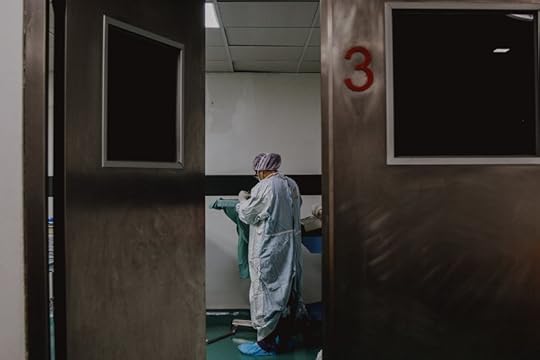 Photographer: SJ Objio | Source: UnsplashWe’re not supposed to talk about our dark thoughts, feelings, or urges
Photographer: SJ Objio | Source: UnsplashWe’re not supposed to talk about our dark thoughts, feelings, or urgesNo-one knows about this because no-one is saying these things out loud. Healthcare professionals aren’t supposed to feel these nasty feelings. They certainly aren’t encouraged to voice them out in the open. But the facts remain. Underneath the smiles and the silence and the tolerant, competent care there’s secret anger, resentment, and frustration brewing in the hearts of many healthcare professionals.
I wonder if one of the reasons for all the burnout we’re seeing is because there’s no outlet for the honest expression of the entire range of emotions healthcare professionals are experiencing right now.
In my years as a psychotherapist, I’ve treated a number of patients with workplace burnout and they all had one thing in common—they were pushing themselves too hard and keeping all their feelings inside.
These patients weren’t all healthcare professionals, but some were. Their common ground was not their line of work but the way that they didn’t take care of themselves; in particular, how they had no outlet for their honest emotions.
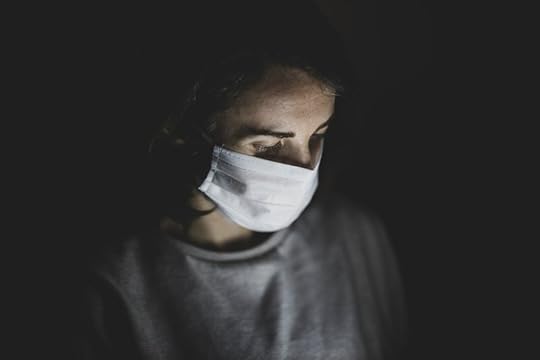 Photographer: engin akyurt | Source: UnsplashThe shadow is the part of our psyche that we’re ashamed of
Photographer: engin akyurt | Source: UnsplashThe shadow is the part of our psyche that we’re ashamed ofYears ago, I was introduced to the Jungian concept of the shadow by the late poet, Robert Bly. I attended some workshops led by him and therapist, Marion Woodman and read Bly’s work entitled, A Little Book on the Human Shadow.
I learned that the shadow is the part of our psyche that we’re embarrassed about and ashamed of. It’s all the ugly, dirty, nasty thoughts, feelings, and urges that we’re not supposed to have and are definitely not supposed to show anyone else.
Many, if not most of us repress the shadow within, but when we do so it’s like putting ourselves in a pressure-cooker and inevitably, the shadow will leak—either outward, in the form of inappropriate blurting and impulsive acts, or inward, by imploding into self-destructive thoughts and behaviours.
I learned that the only way to avoid such destructive leakage was to acknowledge and embrace the shadow part of ourselves—not to act out these feelings and urges against others or ourselves, but to integrate them into our conscious awareness so that we develop mastery over them.
When we own the shadow, we don’t leak the shadow. We can see ourselves honestly for who we are and have as much compassion for our ugly bits as we enjoy the beautiful parts of ourselves and each-other.
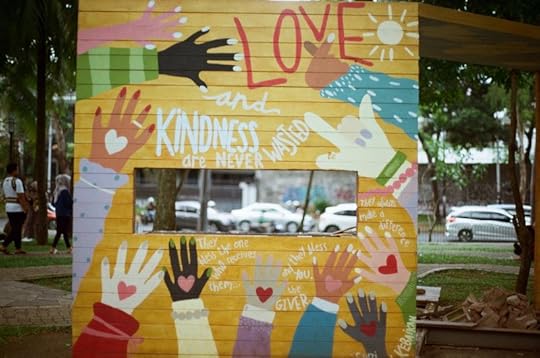 Photographer: Ditto Bowo | Source: UnsplashRuthless Compassion arose from an understanding of the shadow
Photographer: Ditto Bowo | Source: UnsplashRuthless Compassion arose from an understanding of the shadowIt’s not surprising that soon after these workshops, I developed my concept of Ruthless Compassion, which brings together the ideas of loving-kindness with fierce honesty and mental toughness.
With Ruthless Compassion, we can see the truth about ourselves, others, and the world, and we can embrace the darkness within all of us. But, instead of punishing anyone for who they are and what they feel or want, we can be forgiving and accepting toward ourselves, and loving yet well-boundaried with others.
By acknowledging our own darkness, we release the internal pressure so that we’re not compelled to leak these unwanted thoughts, feelings, or urges.
As healthcare professionals, we can accept the darkness within others, and instead of trying to repress our hatred or rage toward them—which will inevitably poison us from the inside—we can see their flawed humanity with ruthless compassion. We can care for them without supporting or enabling their hurtful behaviours. We can love them without approving of their choices.
When I think about compassion fatigue among my colleagues, I recall that as healthcare professionals, we have no forum for expressing our shadow side‚ no permission to even have the thoughts, feelings, or urges that can’t help but arise in a super-stressful and increasingly polarized situation.
We’re supposed to be the paragons of virtue—always selfless, self-sacrificing, and tolerant of the intolerable; never complaining, never negative in any way. That’s simply not humanly possible. We can pretend to do it, but then everyone pays a huge price.
So, if being untarnished and praiseworthy is the only acceptable option, what do many of my colleagues do? They repress their anger, their resentment, their frustration. They keep soldiering on, and because they’re caring individuals, the leakage is directed inward.
They become poisoned by their own repressed negativity. They become so overwhelmed that they can no longer go on. And then the healthcare system begins to crumble.
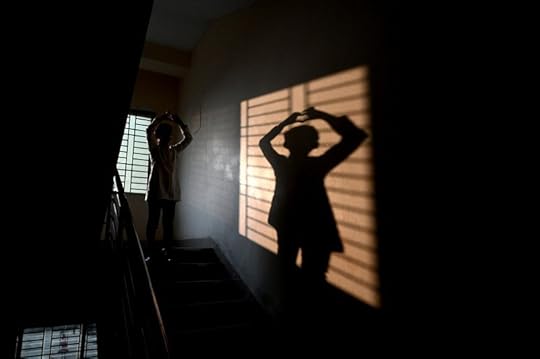 Source: Pexels.comThe way to avoid burnout is to embrace the shadow
Source: Pexels.comThe way to avoid burnout is to embrace the shadowI suggest that the way through is not to deny these ugly-but all-too-human emotions, but to acknowledge and accept them. We need to face our shadow and embrace the darkness within each and every one of us.
When we can start having honest conversations about how we really think, feel and want, the pressure is lifted and we can breathe freely again. We’re less compelled to leak and we feel a sense of wholeness and inner peace.
We can care for our patients knowing that even as we love them, sometimes we hate them; that even as we tend to them with professionalism and respect, sometimes we’re incredibly frustrated with them, and that even as we make time for them, we resent the toll their choices are taking on us, our families and on society.
It's not bad to have these shadow emotions, thoughts, and urges. It’s human. What differentiates the good people from the bad ones is that the good ones don’t want to cause harm to anyone and they always try their best not to do so.
If we want to be good people and avoid burnout and compassion fatigue, we need to accept the ugly, nasty, shadow parts of ourselves. The more we embrace the shadow and integrate the darkness into ourselves the easier it will be to do the right thing while also taking the best possible care of ourselves.
______
Sign up here for my free biweekly wellness newsletter that brings you fresh, thought-provoking content.
Subscribe to my YouTube Channel where you’ll learn simple tips for taking the best care of yourself and your loved ones.
Tune in to my Ruthless Compassion Podcast where I go in-depth about topics like mental health, trauma, and loneliness.
if(window.strchfSettings === undefined) window.strchfSettings = {};window.strchfSettings.stats = {url: "https://marciasirotamd.storychief.io/... "Healthcare Professionals Can Avoid Compassion Fatigue by Embracing The Dark Side",id: "84fb0907-fb13-4676-8158-d29510e9b589"};(function(d, s, id) {var js, sjs = d.getElementsByTagName(s)[0];if (d.getElementById(id)) {window.strchf.update(); return;}js = d.createElement(s); js.id = id;js.src = "https://d37oebn0w9ir6a.cloudfront.net... = true;sjs.parentNode.insertBefore(js, sjs);}(document, 'script', 'storychief-jssdk'))
The post Healthcare Professionals Can Avoid Compassion Fatigue by Embracing The Dark Side appeared first on Marcia Sirota.
January 14, 2022
COVID-19 Shows us That Businesses Are Ill-Equipped to Deal with Employee Mental Health
In the past few years, my psychiatry practice has shifted from predominantly psychotherapy to helping people who are off work for mental health reasons.
After assessing over 500 such individuals in-person, as well as doing hundreds of reviews of medical files, I’ve noticed one significant fact: businesses are woefully ill-equipped at dealing with the mental health of their employees.
Some people go into their jobs with pre-existing mental health conditions, and these individuals are more vulnerable to decompensating under stress. Others have no history of mental health problems but they experience some type of stress in the course of their lives that can lead to mental health problems and impair their ability to do their jobs.
This stress can arise in their personal life or it can come from the workplace, in the form of a difficult colleague or manager who is making their life miserable and undermining their ability to perform optimally in the workplace.
 Source: Pexels.comBusinesses rarely know how to support their staff’s mental health
Source: Pexels.comBusinesses rarely know how to support their staff’s mental healthA lot of businesses don’t understand how to support their employees to keep them functioning optimally, whatever mental health problems they might be facing.
Business leaders often don’t have a good grasp on what causes mental illness and they rarely have a clear sense of how to help people to recover and continue working.
They also don’t know how to protect their workers from disturbed individuals in the workplace and how to deal directly with this particularly insidious source of stress.
Over the years, I’ve learned that there are two types of people at work who have mental health conditions: those who suffer internally and those who act out and make the others around them miserable.
 Source: Pexels.comEmployees with mental health issues can suffer in silence or act out against others
Source: Pexels.comEmployees with mental health issues can suffer in silence or act out against othersPeople who suffer internally will often end up going off work due to an inability to focus or concentrate; severe fatigue due to sleep problems; a lack of energy and motivation due to anxiety and/or depression; and sometimes, a sense of irritability or impatience.
These individuals need support from their management in order to return to work and be constructive and productive employees over the long term. even better, they need support to prevent them from going off work in the first place.
People who act out in the workplace will often behave like bullies. They will sabotage the efforts of their colleagues and they’ll pit one co-worker against another; as supervisors, they might micro-manage, be hyper-critical or set up their staff to fail.
These individuals must be seen for what they are: highly destructive elements in the workplace. They inevitably lower morale and are most often bad for productivity.
These bullies are suffering from their own mental health conditions but they take out their anger on others, creating a toxic workplace environment. They need mental health help as much as anyone else if there’s going to be any chance for them to change their behaviour.
Unfortunately, many businesses don’t fully grasp the impact of these destructive individuals even though, like the old expression goes, one bad apple will spoil the whole bunch.
 Source: Pexels.comBusinesses hold on to toxic staff, even when it hurts productivity
Source: Pexels.comBusinesses hold on to toxic staff, even when it hurts productivityFor unclear reasons, many businesses are invested in retaining managers and supervisors, even when these people are making the workplace increasingly stressful for their staff, and even when it’s evident that staff turnover is sky-high and productivity is in a state of decline.
For equally unclear reasons, businesses often fail to recognize the mental health problems of their staff, even when it has a direct impact on the bottom line through absenteeism, presenteeism and significantly lowered productivity.
Most businesses rely on programs put in place by their insurance companies, such as Employee Assistance or online resources for mental health. Unfortunately, from my experience, these programs are less effective in helping those who suffer from more than a mild mental health condition.
 Source: Pexels.comMore help is needed for employees with mental health issues
Source: Pexels.comMore help is needed for employees with mental health issuesFor people who are dealing with moderate to severe mental health issues, a lot more help is needed, both in the moment and on an ongoing basis.
Mental health needs to be better understood and taken more seriously by businesses if the resources provided are going to be meaningful. The good news is that this change will demonstrate results in lowered absenteeism and presenteeism as well as in increased productivity.
Businesses need to understand that people who are suffering from mental health conditions need robust resources to deal with their problems. For this reason, businesses could consider investing in services like in-house counselors, available at all times to the staff to address whatever stressors they might be experiencing, whether personal or professional. This will lower absenteeism and presenteeism and increase productivity.
As well, businesses need to recognize the problem of having toxic individuals in the workplace and the negative impact they can have on the bottom line. Managers need to identify these individuals in their workplace and offer them counseling to see if their behaviour can change.
If these people are unwilling or unable to modify their behaviour, the business must seriously consider letting them go, as their continued presence in the workplace is destructive to the overall well-being of the company.
Businesses might need to work with employment lawyers to codify what makes a toxic employee or manager, as well as put in place new policies for dealing with such individuals.
Businesses can ask their insurance companies to provide funding for preventative psychotherapy: treatment that is offered before people are forced to go off work due to their mental health issues.
This preventative treatment could keep people at work, and save a considerable amount of money for both the businesses and the insurance companies in the long run.
 Source: Pexels.comMindfulness programs can be helpful
Source: Pexels.comMindfulness programs can be helpfulBusinesses could offer programs for their staff geared toward helping them develop better mental health hygiene. Businesses can offer courses in Mindfulness and in stress management on an ongoing basis.
Businesses can offer workshops in dealing with interpersonal conflict and in developing healthy communication. They can train managers in how to foster positive, productive work environments, and they can prioritize making their workplaces emotionally intelligent and mentally healthy.
The arrival of COVID-19 has increased the stress on businesses, whether small, medium or large. When people are under this kind of intense, ongoing stress, it is bound to have a negative effect on the mental health of workers.
The pandemic is showing us that businesses need to have effective strategies in place for dealing with the mental health of their employees before these people end up on disability. Otherwise, businesses risk suffering the consequences of decreased morale, lowered productivity, and a shrinking bottom line.
______
Sign up here for my free biweekly wellness newsletter that brings you fresh, thought-provoking content.
Subscribe to my YouTube Channel where you’ll learn simple tips for taking the best care of yourself and your loved ones.
Tune in to my Ruthless Compassion Podcast where I go in-depth about topics like mental health, trauma, and loneliness.
if(window.strchfSettings === undefined) window.strchfSettings = {};window.strchfSettings.stats = {url: "https://marciasirotamd.storychief.io/... "COVID-19 Shows us That Businesses Are Ill-Equipped to Deal with Employee Mental Health",id: "84fb0907-fb13-4676-8158-d29510e9b589"};(function(d, s, id) {var js, sjs = d.getElementsByTagName(s)[0];if (d.getElementById(id)) {window.strchf.update(); return;}js = d.createElement(s); js.id = id;js.src = "https://d37oebn0w9ir6a.cloudfront.net... = true;sjs.parentNode.insertBefore(js, sjs);}(document, 'script', 'storychief-jssdk'))
The post COVID-19 Shows us That Businesses Are Ill-Equipped to Deal with Employee Mental Health appeared first on Marcia Sirota.
January 10, 2022
If You Really Want to Lose Weight in 2022, Start Dealing with Your Trauma
As we head into another New Year, a lot of people are talking about better ways to deal with overeating and being overweight. I’m glad to see this, but I’ve noticed that they’re talking about everything except what really works. What no-one is talking about is trauma, and how that’s really at the heart of overeating and being overweight.
I heard a popular comedian talking on the radio the other day. She had struggled with eating issues over the years and she was sharing with the host that she has now resolved to stick to intuitive eating. While some of the principles of this type of eating make sense, I don’t see intuitive eating as a viable option for dieting.
From my decades as a psychiatrist, having worked extensively with overeaters, addicts, and trauma sufferers, I’ve come to see that addiction arises as an unconscious strategy for coping with unhealed emotional wounds and unmet emotional needs.
The reason I don’t see intuitive eating as the answer to overeating and being overweight is that it would be very hard to eat intuitively if your emotional wounds are driving you to overeat. Wounds are so deep and so powerful and the unconscious drive to deal with them is so intense that our wounds will always overpower our intuition.
 Source: Pexels.comTrauma is at the heart of overeating
Source: Pexels.comTrauma is at the heart of overeatingIn my book, Emotional Overeating: Know the Triggers, Heal Your Mind and Never Diet Again, I go into detail about how trauma—whether from childhood or later in life—causes emotional wounds and leaves us with unmet needs. Addiction is one of the ways that many of us deal with trauma.
We engage in addictive behaviours to numb our pain; to fill up an emptiness within; to stimulate ourselves after we’ve become numb in the face of trauma; to distract ourselves from our problems and to soothe our discomfort. The problem with these behaviours is that they promote addiction in two ways.
Physiological: Repetitive behaviours trigger the release of dopamine in our brain. Dopamine gives us a brief burst of a pleasurable sensation but then it increases our craving for whatever activity we were just engaging in or whatever substance we were using. The more we do it, the more we crave it, creating a vicious circle of addiction— something that no amount of intuition can overcome.
Psychological: Addictive behaviours don’t address the real emotional wounds and needs that we carry within ourselves. The more we engage in the addictions, the more hurt, frustrated, and empty we feel. Unfortunately, the way that humans are wired means that we don’t recognize that the problem is with the behaviour we’ve chosen.
Instead of thinking, “Oh, that doesn’t work. I’m going to try something else,” we think, “Oh, that didn’t work. It’s because I didn’t do it enough!” So, we double-down on the addictive behaviour, believing that more of the wrong solution will somehow turn it into the right solution.
 Source: Pexels.comThe cure to addiction is to deal with our trauma
Source: Pexels.comThe cure to addiction is to deal with our traumaThe real way to overcome addiction is to understand both the physiological and the psychological responses to our addictions. We need to work on changing our behaviours, so that we don’t keep triggering the dopamine response, but first, we need to finally address our unhealed emotional wounds and our unmet emotional needs.
When we do that, we’ll lose the urge to overeat—or engage in any other addictive behaviors, for that matter. I’ve seen it over and over, in my practice and in my life. Healing our wounds and pursuing the things that feed our souls—as opposed to our taste buds—is what will enable us to once and for all, stop overeating.
What feeds our souls is meaningful work, relationships, and pastimes; a sense of purpose, creative challenges, learning and growing; building things; helping others and belonging to a community. When we have these things, we no longer feel compelled to pursue false solutions.
One other aspect of trauma, specifically for people who are significantly overweight, is to look at the psychological reasons for being heavy.
 Source: Pexels.comWhy people carry extra weight
Source: Pexels.comWhy people carry extra weightThere are a few specific reasons why people carry a lot of extra body weight: because of sexual abuse and the need to neutralize their sexuality in order to fend off potential predators; because of deep-seated insecurities and the need to hide, or because of profound fears of failure and the need for a scapegoat—where blaming the extra weight is easier than blaming any lack of ability or talent.
These issues must also be dealt with in people who overeat and who are significantly overweight. If the psychological “need” to be overweight remains, weight might be lost but it will always be regained.
 Source: Pexels.comWhy dieting inevitably fails
Source: Pexels.comWhy dieting inevitably failsFinally, we need to look at why dieting fails. When we have trauma and are carrying unmet needs and unhealed wounds, dieting creates a state of deprivation in an individual who already feels severely deprived. That’s why willpower eventually breaks down in most dieters and they regain more weight than they lost.
Dieting also fails because it’s a battle of the will against the wounds, and the wounds will always win because they’re deeper and more powerful than our willpower. We can only successfully impose our will on our behaviour in conjunction with addressing our trauma. If not, it will inevitably fail.
 Source: Pexels.comSelf-discipline works when trauma is addressed
Source: Pexels.comSelf-discipline works when trauma is addressedIf we deal with our trauma by starting to heal our emotional wounds and meet our real needs for love, meaning, purpose and fulfillment, it will be much easier to exercise some self-discipline so as to break the Dopamine vicious circle.
Trauma is at the heart of all addiction and if you really want to stop overeating and get off the dieting band-wagon, or if you have any addictive behaviour that you’re sick of, it’s time to deal with your trauma. Find yourself a good therapist and commit yourself to the journey of healing. It won’t be necessarily quick or easy, but it will work. That I can promise you.
______
Sign up here for my free biweekly wellness newsletter that brings you fresh, thought-provoking content.
Subscribe to my YouTube Channel where you’ll learn simple tips for taking the best care of yourself and your loved ones.
Tune in to my Ruthless Compassion Podcast where I go in-depth about topics like mental health, trauma, and loneliness.
if(window.strchfSettings === undefined) window.strchfSettings = {};window.strchfSettings.stats = {url: "https://marciasirotamd.storychief.io/... "If You Really Want to Lose Weight in 2022, Start Dealing with Your Trauma",id: "84fb0907-fb13-4676-8158-d29510e9b589"};(function(d, s, id) {var js, sjs = d.getElementsByTagName(s)[0];if (d.getElementById(id)) {window.strchf.update(); return;}js = d.createElement(s); js.id = id;js.src = "https://d37oebn0w9ir6a.cloudfront.net... = true;sjs.parentNode.insertBefore(js, sjs);}(document, 'script', 'storychief-jssdk'))
The post If You Really Want to Lose Weight in 2022, Start Dealing with Your Trauma appeared first on Marcia Sirota.
COVID-19 is a Wake-Up Call to Finally Smarten Up About Our Mental Health Before It’s Too Late
Starting a new year is usually about optimism, but the latest wave of the pandemic has led to unprecedented pessimism. Everywhere I look, people are feeling totally overwhelmed. Many are starting to decompensate because of the unrelenting strain on their mental health brought about by isolation, deprivation, loss, fear, and uncertainty. For many people, the glass hasn’t been half-full for the longest time.
With each consecutive wave of the pandemic, our mental health has deteriorated further, to the point where it's now at an all-time low. Rates of anxiety, depression and addiction are skyrocketing. Gender-based violence has been more frequent and severe, according to a national study conducted in 2020. Children, adolescents, and young adults are in crisis. Everyone is at their breaking point.
The pandemic has brought the subject of mental health to the forefront. Millions of people are recognizing the toll COVID-19 has taken on their own mental well-being and that of their loved ones.
 Source: Pexels.comWe’ve never prioritized mental health
Source: Pexels.comWe’ve never prioritized mental healthFrom my perspective as a psychiatrist, mental health has never been taken seriously. Before the pandemic, mental health wasn’t a priority, in part, because of the stigma associated with addiction and mental disorders.
The prevention and treatment of mental illness have been grossly been underfunded compared to all other types of illness, whether in the private system or in publicly-funded health-care. Even so, according to a report by the Mental Health Commission of Canada, mental illness is the number one cause of disability here, making up around a third of all disability claims.
Insurance companies are notoriously reluctant to fund ongoing psychotherapy and even if people can afford it, it’s difficult to find an available therapist at the best of times. Now, when the pandemic is raging and people are desperately seeking help, the lack of resources has come into sharp perspective.
From my experience, the pandemic has brought about a raft of specific stress-related disorders, from malaise to adjustment disorders, all the way to full-blown Post-Traumatic Stress Disorder (PTSD). These conditions can have profound effects on a person’s ability to interact with others, whether in a personal or professional context.
Given the scarcity of mental health practitioners and the persistence of the pandemic, it’s going to be that much more difficult for people to recover from these conditions and to have positive, constructive relationships, moving forward.
 Photographer: Alex McCarthy | Source: UnsplashSociety is breaking down
Photographer: Alex McCarthy | Source: UnsplashSociety is breaking downI’m worried that if there are future waves and further restrictions imposed, our mental health will deteriorate even further. One of the things I fear is a breakdown of civilized society.
We’re already seeing signs of it today, with people becoming ruder and more hostile all over; they’re more irritable and impatient and much less understanding. Violent protests have broken out across Europe and here in North America. When mental health deteriorates, people tend to regress psychologically, becoming more selfish, insensitive, intolerant, and aggressive.
The longer the pandemic goes on, the more we risk the vicious circle of trauma causing us to be more selfish and combative, and this type of behaviour, in turn, generates that much more trauma. To avoid a total breakdown of society, we need to start leading with compassion.
We have to get back to looking out for one-another. We’re all at our most vulnerable these days and we need more kindness and gentleness, not more anger and abuse. We have to begin caring about one another before we risk chaos taking over.
Lately, caring seems to be in short supply. A colleague of mine was recently bemoaning the lack of a conscience in so many of the people she knows. She said that most of them were going out and interacting with other people, even when they had come down with flu-like symptoms; even when they hadn’t been tested and didn’t know if they had a cold, or COVID.
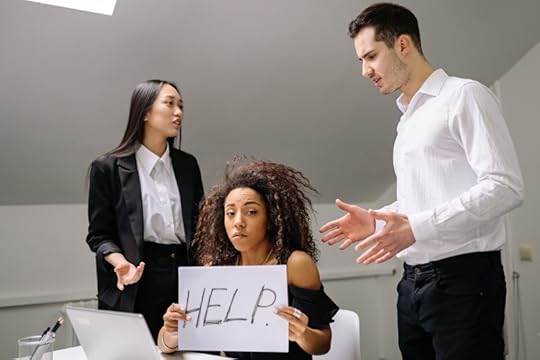 Source: Pexels.comWe need to attend to our mental health
Source: Pexels.comWe need to attend to our mental healthWe all need to grow a conscience and to start being goodhearted and solicitous toward one-another. In order to do this, the first thing that has to happen is for us to take care of our mental health. It will be near-impossible to be the kindest, most loving versions of ourselves if we’re struggling with depression, panic, substance use, or PTSD.
This is the time for more empathy. When everyone is suffering so much, we need to be more sensitive to everyone’s plight. Unfortunately, chronic stress and mental strain can make us numb and disinterested; cold and callous, and devoid of scruples. And now, as we go into another series of restrictions, the mental strain is only going to increase.
Whether the pandemic ends sooner or later, we can decide now to make mental health a priority. After all, it’s not just the long-term effects of COVID that we need to be concerned about when the pandemic is over—it’s the long-term effects of PTSD, loneliness, and all the other mental health conditions we’ve been suffering from over the past two years.
So, how can people heal and recover in 2022? We all need to recognize the importance of our mental health and pursue the care we deserve. Whether it’s counseling, coaching or psychotherapy, rehabilitation, or medication, we can pursue the appropriate treatment, right now.
It's time to see the stigma around mental health as an old, tired trope. No-one feels shame when they have problems with their physical health, so we need to stop shaming each-other for having problems with our mental health.
If not, we risk a breakdown of society in which selfishness, insensitivity, and intolerance become the norm and it becomes increasingly rare to find the kindness, compassion, and consideration that we all need so much.
 Source: Pexels.comWe don’t want to be the walking wounded
Source: Pexels.comWe don’t want to be the walking woundedAs we emerge from the pandemic, we don't want to be labeled as the walking wounded. We want to be resilient, vibrant individuals who’ve weathered the storm and who feel connected to our communities. Smartening up about our mental health means taking charge and getting the help we need so we can stop being overwhelmed by malaise, numbness, and despair.
The way to do this is to prioritize mental health on a personal, community, and government level. People need to see how their own mental health affects the well-being of others and vice versa.
We can disagree with one-another, without attacking one-another.People should call each other out when they read or hear things that are not factual, but they should never attack each other as individuals when they disagree, point fingers at a topic and point of view especially when the facts are not clear. But people should never point fingers and attack other individuals directly when they disagree.
As we come out of the pandemic, it's important to reach out to others and offer empathy and support. These kind gestures could improve someone's mental health when they’re hurting.
Sooner or later, we'll all need help and when everyone is paying it forward, our communities will be there to support us in our time of need. Taking care of individual mental health is the way our society as a whole can heal and everyone can begin to thrive in the long-term.
______
Sign up here for my free biweekly wellness newsletter that brings you fresh, thought-provoking content.
Subscribe to my YouTube Channel where you’ll learn simple tips for taking the best care of yourself and your loved ones.
Tune in to my Ruthless Compassion Podcast where I go in-depth about topics like mental health, trauma, and loneliness.
if(window.strchfSettings === undefined) window.strchfSettings = {};window.strchfSettings.stats = {url: "https://marciasirotamd.storychief.io/... "COVID-19 is a Wake-Up Call to Finally Smarten Up About Our Mental Health Before It's Too Late",id: "84fb0907-fb13-4676-8158-d29510e9b589"};(function(d, s, id) {var js, sjs = d.getElementsByTagName(s)[0];if (d.getElementById(id)) {window.strchf.update(); return;}js = d.createElement(s); js.id = id;js.src = "https://d37oebn0w9ir6a.cloudfront.net... = true;sjs.parentNode.insertBefore(js, sjs);}(document, 'script', 'storychief-jssdk'))
The post COVID-19 is a Wake-Up Call to Finally Smarten Up About Our Mental Health Before It’s Too Late appeared first on Marcia Sirota.
Marcia Sirota's Blog
- Marcia Sirota's profile
- 1 follower



